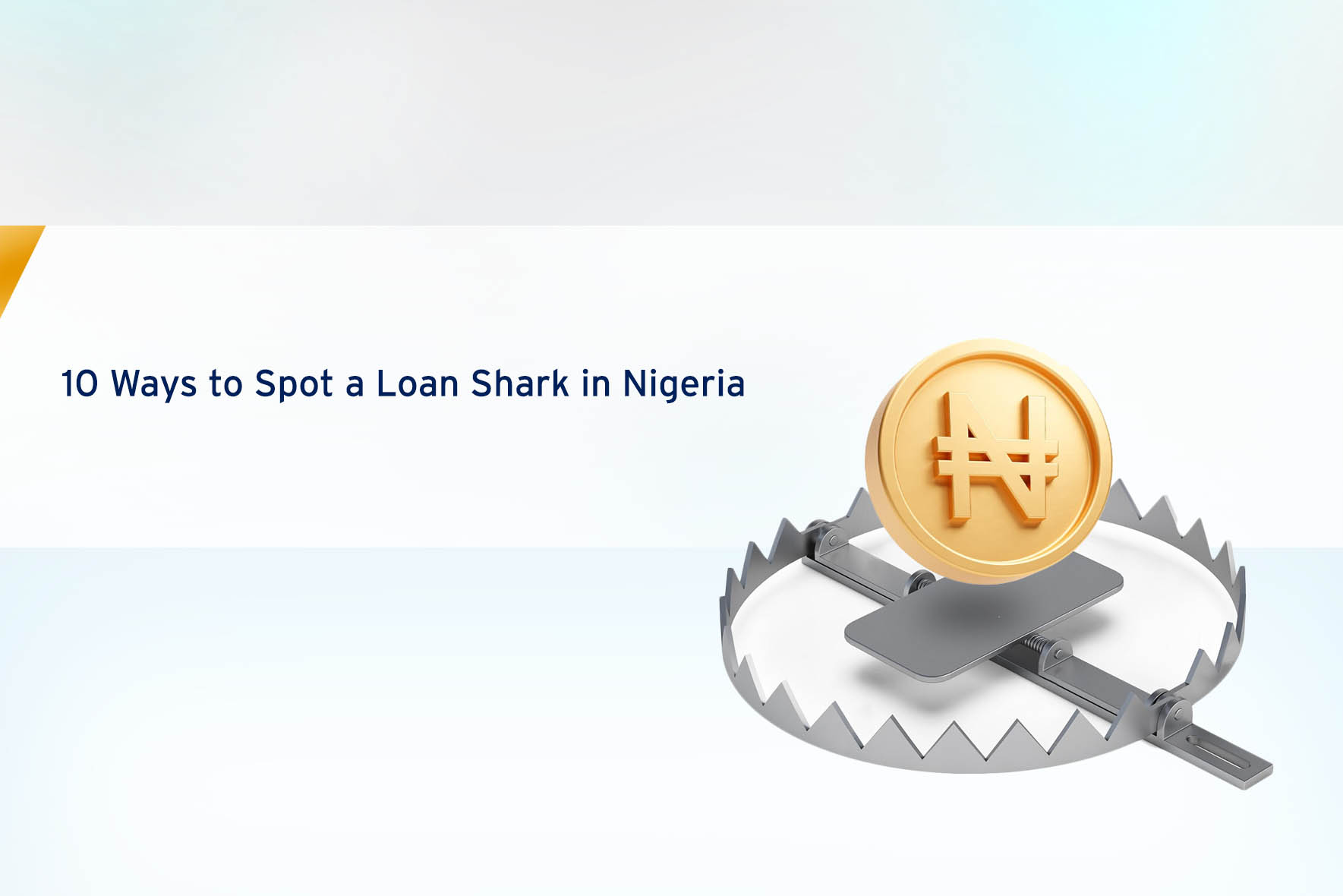
10 Ways to Spot a Loan Shark in Nigeria
Author Taiwo Temitope-Adesope
Loan sharks, also known as predatory lenders, are individuals or organisations that offer loans at extremely high-interest rates. They are known to operate outside the scope of regulatory oversight and consumer protection laws.
Loan shark activities are illegal in Nigeria. The Money Lenders Law gives the Central Bank of Nigeria the authority to regulate money lending activities, set interest rates, and enforce compliance with regulations.
Other bodies responsible for protecting both borrowers and lenders, ensure fair practices, and promote financial stability in Nigeria include the Federal Competition and Consumer Protection Act (FCCPA), the National Information Technology Development Agency (NITDA) as well as the Federal Inland Revenue Service (FIRS).
Warning signs of a loan shark operation
As stated, loan sharks in Nigeria are illegal lenders who use predatory practices to exploit borrowers, often charging exorbitant interest rates and resorting to aggressive tactics for debt collection.
Here are some warning signs of a loan shark operation:
1. No license or registration
Loan sharks operate without a valid license or registration from relevant financial authorities. Legitimate lenders are required to comply with regulations and have proper licensing.
2.High-pressure sales tactics
One of the modes of operation is to use aggressive and high-pressure tactics to convince borrowers to take out a loan. They may create a sense of urgency or force borrowers into making quick decisions.
3.No clear terms and conditions
Loan sharks may not provide clear and transparent terms and conditions. They might avoid providing written agreements or use confusing language in the loan contract.
4.Excessive interest rates
They are also known to charge extremely high-interest rates, often well beyond legal limits set by regulators. They may also use compounding interest, making it challenging for borrowers to repay the debt.
5.Unreasonable fees and penalties
Unethical money lenders may impose hidden fees and penalties that significantly increase the cost of borrowing. These fees may be unrelated to the actual services provided.
6.Securing loans with threats or blackmail
Loan sharks may resort to threats, intimidation, or blackmail to force borrowers into taking a loan or making repayments.
7.Unsolicited offers
Be cautious of loan offers that come through unsolicited emails, text messages, or phone calls. Reputable lenders do not engage in such practices.
8.No physical address
Loan sharks often operate without a physical office or legitimate business address. They may use mobile phones or untraceable contact details.
9.No credit checks
Loan sharks may claim not to conduct credit checks or ask for collateral. While this might seem appealing, it is a sign of an illegal operation.
10. Lack of Documentation
Loan sharks may avoid providing proper documentation, receipts, or loan agreements, making it challenging for borrowers to keep track of their financial obligations.
If you encounter any of these warning signs or suspect that you are dealing with a loan shark, it’s essential to avoid any further involvement and seek legal advice or report the activity to local authorities.
Borrowing from illegal lenders can lead to severe financial and personal consequences. Always choose reputable and licensed lenders to ensure your financial safety and well-being.
Avoiding Loan Shark Scams
Avoiding loan shark scams is essential to protect yourself from unscrupulous individuals or organizations that engage in illegal and predatory lending practices. This involves being well-informed, making responsible borrowing choices, and seeking reputable lending sources.
Here are some tips to help you steer clear of loan shark scams:
-
Choose reputable lenders
Only borrow from reputable and licensed financial institutions, banks, credit unions, or online lenders that are regulated and registered with appropriate authorities. Verify the lender’s credentials and check reviews and feedback from other borrowers.
-
Be wary of unsolicited offers
Be cautious of loan offers that come through unsolicited emails, phone calls, or text messages. Legitimate lenders typically do not approach potential borrowers in this manner.
-
Research the lender
Do thorough research on the lender before agreeing to any loan terms. Check if they have a physical office, a legitimate website, and contact information. Scammers often use fake websites and untraceable phone numbers.
-
Watch for upfront fees
Legitimate lenders do not ask for upfront fees before approving a loan. If a lender asks for payment before providing the loan, it is likely a scam.
-
Read the terms and conditions
Thoroughly read and understand the loan agreement before signing it. Pay attention to interest rates, repayment terms, and any hidden fees.
-
Avoid high-pressure tactics
Scammers may use aggressive and high-pressure tactics to force you into taking a loan. A legitimate lender will give you time to review the terms and make an informed decision. If you are feeling pressured into taking a loan, it is most likely a scam.
-
Check the interest rates
Loan sharks often charge exorbitant interest rates far beyond legal limits. Compare the interest rates offered by the lender with the market average to ensure they are reasonable.
-
Don’t share sensitive information
Avoid sharing personal and financial information unless you are certain the lender is legitimate. Scammers can use this information for identity theft.
-
Report suspicious activities
If you suspect a lender may be operating as a loan shark or engaging in fraudulent activities, report it to the appropriate authorities, such as the local police or financial regulatory agencies.
-
Seek professional advice
If you are unsure about a lender or loan offer, consult a financial advisor or seek advice from a credit counselling agency before proceeding.
The ultimate guide to finding legitimate loans in Nigeria
Finding legitimate and affordable loans in Nigeria requires careful research and consideration. Here’s a comprehensive guide to help you navigate the process and make informed decisions:
-
Know your needs
Determine the exact amount you need to borrow and the purpose of the loan. This will help you identify the most suitable loan options.
-
Research online lenders
Start by researching legitimate online lenders in Nigeria. Look for well-established financial institutions, microfinance banks, or credit unions with positive reviews and a strong reputation.
-
Check credibility
Verify the lender’s credibility by checking if they are registered with relevant regulatory bodies, such as the Central Bank of Nigeria (CBN) or the Nigerian Deposit Insurance Corporation (NDIC).
-
Interest rates and fees
Compare interest rates and fees across different lenders to find the most affordable option. Be cautious of lenders offering extremely low rates as they may be fraudulent.
-
Transparency
Legitimate lenders are transparent about their terms and conditions. Avoid lenders that use unclear or misleading language in their agreements.
-
Consider collateral-free loans
Look for collateral-free loan options, as they can be more accessible and less risky.
In summary, dealing with loan sharks can lead to severe financial consequences and potential harm. Always prioritize borrowing from reputable and legal sources to protect yourself and your financial well-being. If you or someone you know has fallen victim to loan shark activities in Nigeria, it is advisable to seek legal advice and report the situation to the appropriate authorities, such as the police or the FCCPA.
Don’t forget to visit nairaCompare to learn more about ethical loan practices, affordable loans and savings options available.
About Author

Taiwo Temitope-Adesope
Taiwo is a passionate storyteller and strategist dedicated to empowering women and crafting compelling narratives. A First-Class graduate in Mass Communication from Covenant University, she specializes in writing, public relations, and digital marketing. As a Content Manager at Suretree, she drove a 50% increase in web traffic through SEO and boosted website engagement by 60% in just four months. Her leadership experience includes serving as Public Relations Officer for the Covenant University Student Council and contributing to impactful volunteer initiatives. With expertise in strategic thinking and business acumen, Taiwo continues to create stories that inspire confidence and imagination.









